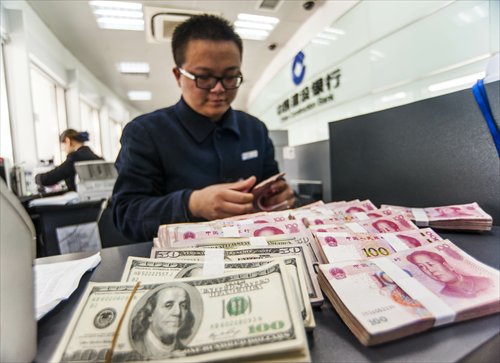Deficit rise can aid growth: minister
Spending bump also set to boost public services

An employee counts bank notes at a bank in Hai'an, East China's Jiangsu Province on March 1, 2016. Photo: CFP
China has room to raise the deficit in order to support growth, but not by too much, Finance Minister Lou Jiwei said at a press conference on Monday.
China has already budgeted for a deficit of 3 percent of GDP in 2016, a rise of 0.6 percentage points from the ratio of 2.4 percent recorded in 2015, according to the Government Work Report delivered by Premier Li Keqiang on Saturday at the fourth session of the 12th National People's Congress, China's top legislature.
The country's fiscal income accounts for 30 percent of GDP, while government debt accounts for about 40 percent of GDP, which are both relatively low levels compared with other countries, Lou said.
"Due to various problems amid China's economic new normal, we have increased the deficit-to-GDP ratio appropriately in accordance with the guidelines set by the central government, which is intended to help the economy achieve medium- to high-speed growth while also pushing forward with structural reform," Lou said.
He also explained that the increased spending will help with improving public services.
Analysts said it sends a strong signal about fiscal easing, which is needed under the current circumstances to stabilize economic growth, but they also expressed some doubts about the effect it would have on the economy.
The expanding government debt and loose monetary policy "point to a further increase in leverage in the economy, which risks raising contingent liabilities for the government," Marie Diron, a senior vice president with the sovereign risk group at Moody's, said in an e-mail sent to the Global Times on Monday.
According to Zhu Tian, professor of economics at the China Europe International Business School, the new budget deficit target shows that China remains quite conservative in setting its deficit policy, because 3 percent is still low compared with the normal levels of 4 to 5 percent in other countries.
"The government usually reduces taxes and fees to achieve fiscal easing, but the traditional way is unlikely to have much impact amid an economic slowdown," Zhu told the Global Times on Monday.
"Meanwhile, it is hard to tell for the time being whether government spending on infrastructure and social benefits can boost the economy," Zhu said.
Fiscal support will focus on tax cuts as well as infrastructure and social spending this year, according to both the Government Work Report and budget reports.
Support needed for reform
At the Monday press conference, Lou also noted that the government still has room to increase debt, which could be used to support supply-side structural reforms.
Unlike in the past when the government usually took measures to stimulate demand to digest excess supply, now supply-side reform will tackle the problem by introducing more market-based operations, which may involve the elimination of excess capacity and require fiscal support like subsidies to help find new employment for laid off workers, Feng Liguo, an expert with the China Enterprise Confederation, told the Global Times Monday.
The country's major industrial enterprises registered a decline in annual profits in 2015, the first annual fall since the data gathering system was revised in 2011, the National Bureau of Statistics said in January, and enterprises burdened by overcapacity were a major factor in the poor results.
The surplus capacity in China's steelmaking sector is bigger than the entire steel output of Japan, the US and Germany combined, according to a report by The Economist in February.
Despite officials' emphasis on restructuring as a way to tackle excess capacity, the intended supply-side reforms could prove challenging, UBS said in a note sent to the Global Times on Monday.
The government announced earlier this year that it plans to reduce the capacity of China's steel and coal sectors by over 10 percent in the next few years, a pace considered slow by many in the industry, the UBS note said.
The government also said it will try to focus more on mergers and restructuring rather than on bankruptcy and closures, in order to minimize the negative impact on employment.
China will set aside 100 billion yuan ($15.35 billion) to support the resettlement of workers in sectors plagued by overcapacity, with 50 billion yuan allocated for 2016 and the rest for 2017, Lou said.